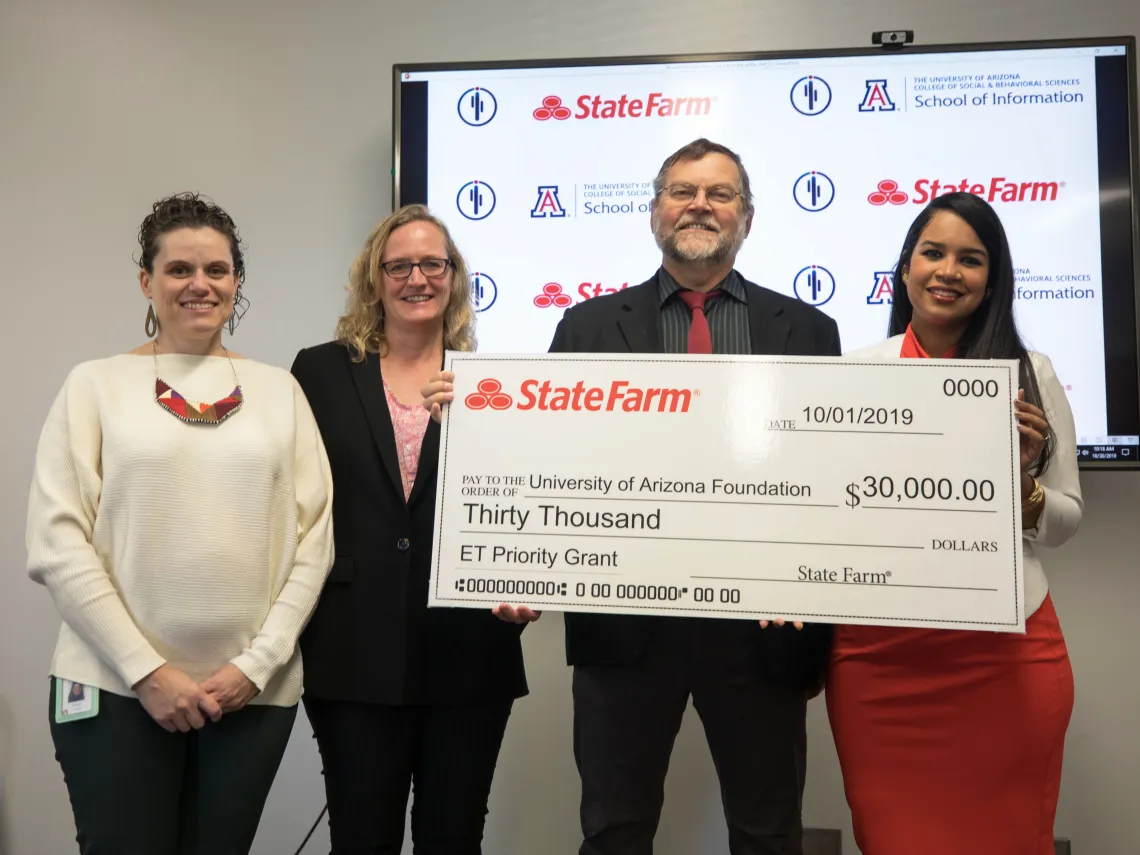iSchool Receives Grant from State Farm to Teach Coding to K-12 Students

On Oct. 30, 2019, State Farm presented the University of Arizona School of Information with a $30,000 check to support undergraduates teaching computer coding to K-12 students as part of Pima County Public Library’s Code Club program. (l-r): Kendra Davey, Literacy Initiatives Program Manager with the Pima County Public Library; Catherine Brooks, director of the University of Arizona School of Information; Bryan Heidorn, professor in the School of Information; and Annie Frits, State Farm agent in Tucson.
Undergraduates from the University of Arizona School of Information, or iSchool, will teach K-12 students computer coding, thanks to a $30,000 grant from State Farm.
The iSchool will train five undergraduate students to become State Farm Community Technology Peer Preceptors. These Peer Preceptors will teach coding at local branches of the Pima County Public Library, or PCPL, as part of the library’s Code Club program.
The goal of the program is to expand coding instruction to K-12 students, helping them build confidence in their ability to master technology and to open up prospects for college and employment. The program will encourage the participation of girls and minorities, aiming to increase the number of women and underrepresented groups in IT and STEM (Science, Technology, Engineering and Mathematics) fields.
The State Farm grant will provide a stipend and travel expenses to the college students participating as Peer Preceptors, as well as fund software licenses for the library. Peer Preceptors will also receive funds to participate in the Grace Hopper Celebration, which is the world's largest gathering of women technologists.
“State Farm understands the importance of education in our communities and has a long history of supporting initiatives that foster learning, innovation and the sharing of knowledge with others. This grant continues our support of the University of Arizona and the School of Information in their endeavors to make a difference in the community,” said Jason Johnson, Technology Manager at State Farm.
Expanding the Pima County Public Library’s Coding Program
Pima County Public Library has been offering their Code Club program using the Prenda platform for self-paced learning over the last year and plans to expand the program. The participation of State Farm Community Technology Peer Preceptors, because of their training in programming and instruction, will enhance the program and allow PCPL to reach more students.
The clubs are held throughout the year at multiple branch locations, and middle and high school students are encouraged to participate. Research shows that a lack of participation of women and minorities in the information technology workforce can be linked to lower engagement with IT in middle and high school.
“I'm excited about this collaboration, because of the opportunity to get undergraduate students from the UA working with the kids in our Code Club so that the kids can see if they get excited about technology and coding computers,” said Kendra Davey, Literacy Initiatives Program Manager with the Pima County Public Library. “There may be kids in our Code Club who don’t know someone who has a career in this sort of field. This program gives them an opportunity to meet a university student and really see what comes next, and that will keep them motivated and excited to keep going with this as a potential career.”
Training and Diversifying iSchool Students
In addition to providing training to K-12 students in the community, the program will also benefit iSchool Peer Preceptors by offering them a community engagement experience and improving their skills.
“Research shows that peer mentoring can produce successful educational outcomes, and that hands-on learning opportunities tend to have a lasting impact on students at all levels,” said Bryan Heidorn, professor in the School of Information, who applied for the grant.
The program will also provide preceptors with a competitive advantage for future job placement by enhancing their communication skills and mastery of technology.
By providing coding training to middle and high school students, the iSchool also hopes that the program will increase the number of women and minorities in the school’s majors.
The iSchool teaches STEM topics to more than 1000 students majoring in its three undergraduate programs – Information Science and Arts, Information Science and eSociety, and Information Science and Technology.
“Tucson, which is becoming a hub for computing industries, provides numerous well-paying and rewarding job opportunities,” said Heidorn. “With the support of State Farm, this new program will empower college students to share their knowledge and excitement for the field with youth in communities across the city. This community engagement will help to develop student communication skills and increase their effectiveness in the workplace when they have finished their degree programs.”

